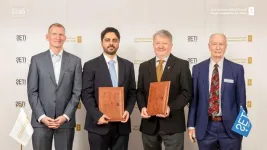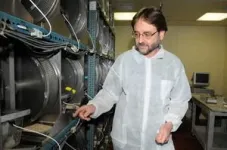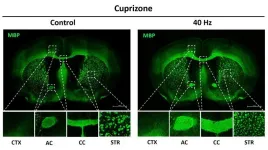(Press-News.org) Royal Commission for AlUla Collaborates with SETI Institute to Support Development of AlUla Manara Observatory
Experts from SETI Institute will support the advancement of telescope technology and data analysis at AlUla Manara Observatory.
The collaboration will enhance the future observatory's capabilities as it welcomes global scientists, researchers, and tourists interested in astronomy and space science.
Ambitions to foster curiosity, knowledge sharing, and upskilling local capabilities in astronomical and space sciences field
Mountain View, CA , 8 August 2024 -- The Royal Commission for AlUla (RCU) and SETI Institute announced their collaboration agreement as part of a long-term vision to further the development of AlUla Manara Observatory as a leading destination of the future, for space research, discovery and astro-tourism.
AlUla is an ancient desert oasis located in North West Saudi Arabia with more than 200,000 years of recorded human history and ancient heritage sites with 7000 years of successive civilizations. The AlUla Manara Observatory is part of an ambitious plan to develop AlUla into a premier destination with a focus on sustainability, community and cultural and knowledge enrichment.
As part of the agreement, the SETI Institute will facilitate installation of a Laser SETI instrument at AlUla Manara Observatory. LaserSETI, an optical SETI project, monitors the sky for laser flashes that could indicate the presence of extra-terrestrial technology. The LaserSETI station would be part of a broader network scanning the entire northern hemisphere night sky from various locations.
Naif Almalik, AlUla Manara’s Executive Programme Director, said, "This collaboration enhances AlUla's evolving role as a dynamic hub for science and knowledge exchange. It will equip AlUla Manara with the instruments needed to observe the cosmos in extraordinary detail and establish AlUla as a premier destination for research and astro-tourism. Just an hour's drive from AlUla’s center, the observatory will inspire local youth to pursue diverse careers in advanced STEM fields, supporting the growth and economic diversification of Saudi Arabia in line with the Kingdom's Vision 2030 ambitions. “
Additionally, the SETI Institute will support in developing data analysis systems for some of the telescopes housed at AlUla Manara Observatory and provide expertise in hardware and instrument development. The SETI Institute's Center for Education plans to support training teachers and students using virtual reality tools to enhance local astronomy and space science capabilities. The outreach center will also create communication resources to engage visitors at AlUla Manara Observatory in astronomy, astrobiology, and SETI, aligning with RCU's vision for AlUla to become a regional hub for research, innovation, and education.
Bill Diamond, SETI Institute CEO, said, “Embedded in the SETI Institute’s mission statement is the importance of sharing our research with the world. We are excited about this collaboration with RCU where we see the opportunity to bring the fascination of space science and education to a part of the world where there is far too little joint engagement in research, education and technology development. Curiosity unites us all as humans, and science is a powerful way to bring people closer together from different geographies and cultural backgrounds.”
The collaboration will also facilitate a diverse range of joint research projects, contribute to the growing astro-tourism initiatives already recognized and popular in AlUla, it also provides educational and upskilling opportunities for students from AlUla and across the Kingdom. The AlUla Manara Observatory is slated for a phased opening to the public in the coming years, with collaborations, research, public events, and education initiatives underway.
Franck Marchis, Senior astronomer and director of citizen science for Unistellar at the SETI Institute, said: “We envision the AlUla Manara Observatory as a beacon of discovery, equipped with advanced and cutting-edge telescopes to unveil new celestial bodies and propel astronomical research to new heights. Our Citizen Science initiative will invite the community and tourists alike to stargaze and explore AlUla's rich scientific heritage, fostering international collaborations and reviving humanity’s profound connection to the cosmos.”
The SETI Institute’s mission is to lead humanity's quest to understand the origins and prevalence of life and intelligence in the universe and to share that knowledge with the world. In addition to its own astronomical observatory, the Allen Telescope Array, SETI Institute researchers utilize an unparalleled network of advanced ground and space-based instruments. The SETI institute also leverages data from space-based observatories such as the James Webb Space Telescope, as well as instruments in orbit around or on Mars, including the Perseverance and Curiosity rovers.
About the Royal Commission for AlUla
The Royal Commission for AlUla (RCU) was established by royal decree in July 2017 to preserve and develop AlUla, a region of outstanding natural and cultural significance in north-west Saudi Arabia. RCU’s long-term plan outlines a responsible, sustainable, and sensitive approach to urban and economic development that preserves the area’s natural and historic heritage while establishing AlUla as a desirable location to live, work, and visit. This encompasses a broad range of initiatives across archaeology, tourism, culture, education, and the arts, reflecting a commitment to meeting the economic diversification, local community empowerment, and heritage preservation priorities of the Kingdom of Saudi Arabia’s Vision 2030 programme
About the SETI Institute
Founded in 1984, the SETI Institute is a non-profit, multi-disciplinary research and education organization whose mission is to lead humanity’s quest to understand the origins and prevalence of life and intelligence in the Universe and to share that knowledge with the world. Our research encompasses the physical and biological sciences and leverages expertise in data analytics, machine learning and advanced signal detection technologies. The SETI Institute is a distinguished research partner for industry, academia and government agencies, including NASA and NSF.
For media enquiries:
Royal Commission for AlUla publicrelations@rcu.gov.sa
SETI Institute, Director of Communications, Rebecca McDonald rmcdonald@seti.org
END
Royal Commission for AlUla collaborates with SETI Institute to support development of Alula Manara Observatory
Experts from SETI Institute will support the advancement of telescope technology and data analysis at AlUla Manara Observatory.
2024-08-08
ELSE PRESS RELEASES FROM THIS DATE:
Cutting a few calories won’t hurt your workout
2024-08-08
A new UC Riverside study demonstrates that calorie restriction doesn’t deter mice from exercising, challenging the belief that dieting drains workout energy.
The study, published in the journal Physiology & Behavior, shows that cutting calories by 20% did not significantly reduce the distance that mice voluntarily chose to run each day.
The researchers set out to understand what happens to mice when the amount of food available to them is reduced. The findings, they hoped, would be relevant ...
Study reveals ways in which 40Hz sensory stimulation may preserve brain’s ‘white matter’
2024-08-08
Early-stage trials in Alzheimer’s disease patients and studies in mouse models of the disease have suggested positive impacts on pathology and symptoms from exposure to light and sound presented at the “gamma” band frequency of 40 Hz. A new study zeroes in on how 40Hz sensory stimulation helps to sustain an essential process in which the signal-sending branches of neurons, called axons, are wrapped in a fatty insulation called myelin. Often called the brain’s “white matter,” myelin protects axons and insures better ...
Record-breaking recovery of rocks that originated in Earth’s mantle could reveal secrets of planet’s history
2024-08-08
Scientists have recovered the first long section of rocks that originated in the Earth’s mantle, the layer below the crust and the planet’s largest component.
The rocks will help unravel the mantle’s role in the origins of life on Earth, the volcanic activity generated when it melts, and how it drives the global cycles of important elements such as carbon and hydrogen, according to the team.
The nearly continuous 1,268 metres of mantle rock was recovered from a “tectonic window,” a section ...
Surprise: infected bacteria fight back with “hidden” genes that halt cell growth, slow viral spread
2024-08-08
Researchers have uncovered a surprising way bacteria defend themselves: when a bacterium is infected, bacterial enzymes that copy genetic information from RNA into DNA synthesize genes whose protein products help shut down cell growth. This prevents further viral spread in the neighboring bacterial population. The results highlight the potential for other “hidden” genes, like the one found here, to be unearthed in different biological contexts. Bacteria defend themselves from viral ...
Early prenatal exposure to famine increases Type 2 diabetes risk in adulthood, shows study of historical Ukraine event
2024-08-08
Prenatal exposure to famine significantly increases the risk of developing Type 2 diabetes mellitus (T2DM) in adulthood, according to a new study of people impacted by the 1932-1933 Holodomor famine in Ukraine. While the immediate and short-term effects of famines on mortality and morbidity are well-documented, deciphering famines’ long-term health consequences – as this study did – has been more difficult. Previous research has suggested a link between prenatal nutrition and adult health ...
Marine algae use massive enzymes of unprecedented size to biosynthesize fish-killing toxins
2024-08-08
Marine algae Prymnesium parvum use massive enzymes dubbed PKZILLAs – some of the largest proteins ever to be identified in nature – to make large and complex prymnesin neurotoxins responsible for mass fish kills during harmful algal blooms worldwide, researchers report. “The discovery and initial characterization of the prymnesin PKZILLA gigasynthases now elucidates the long-standing question about how microalgae biosynthesize their giant polyketide polyether molecules,” write the authors. It also expands ...
Record-breaking 1.2-kilometer drill core unveils new insights into Earth's mantle
2024-08-08
A record-breaking 1268-meter drill core into Earth’s mantle, collected from the Mid-Atlantic Ridge in the North Atlantic, has provided a deep and detailed mineralogical glimpse of the oceanic mantle. The findings reveal new insights into mantle composition, Earth’s deep geology, and the potential biogeochemical conditions involved in the origins of life. Understanding the Earth’s mantle is crucial for comprehending important details of the Earth system, including terrestrial magmatism, crust formation, and the cycling ...
American College of Cardiology issues guide for managing in-patient heart failure
2024-08-08
The American College of Cardiology has issued updated guidance on managing patients hospitalized for heart failure (HF) to provide a decision-making pathway that tailors therapy to clinical trajectory to better manage disease. The updated Expert Consensus Decision Pathway incorporates the latest evidence to provide guidance for clinicians to use at the point of care in conjunction with the 2022 ACC/AHA Heart Failure Guideline.
Heart failure refers to several conditions that can affect the way the heart works, its structure or both. Over time, heart failure makes ...
Type 2 diabetes cases more than doubled seven decades after exposure to famine
2024-08-08
Researchers at Columbia University Mailman School of Public Health, the University of North Carolina at Chapel Hill and at the National Academy of Sciences of Ukraine used the setting of the man-made Ukrainian Holodomor famine of 1932-1933 to examine the relation between prenatal famine and adult Type 2 diabetes mellitus (T2DM). They studied 128,225 Type 2 diabetes cases diagnosed between 2000-2008 among 10,186,016 male and female Ukrainians born between 1930 and 1938.
Individuals who were exposed in early gestation to the famine had a more than two-fold likelihood of developing Type 2 diabetes compared to those ...
Millions of years for plants to recover from global warming
2024-08-08
In brief:
Disruption of the functioning of vegetation due to warming can lead to the failure of climate regulating mechanisms for millions of years.
Vegetation changes can alter the planet’s climate equilibrium.
Geological and climatic history provide insight into the effects of global warming today.
Scientists often seek answers to humanity’s most pressing challenges in nature. When it comes to global warming, geological history offers a unique, long-term perspective. Earth’s geological ...
LAST 30 PRESS RELEASES:
New knowledge on heritability paves the way for better treatment of people with chronic inflammatory bowel disease
Under the Lens: Microbiologists Nicola Holden and Gil Domingue weigh in on the raw milk debate
Science reveals why you can’t resist a snack – even when you’re full
Kidney cancer study finds belzutifan plus pembrolizumab post-surgery helps patients at high risk for relapse stay cancer-free longer
Alkali cation effects in electrochemical carbon dioxide reduction
Test platforms for charging wireless cars now fit on a bench
$3 million NIH grant funds national study of Medicare Advantage’s benefit expansion into social supports
Amplified Sciences achieves CAP accreditation for cutting-edge diagnostic lab
Fred Hutch announces 12 recipients of the annual Harold M. Weintraub Graduate Student Award
Native forest litter helps rebuild soil life in post-mining landscapes
Mountain soils in arid regions may emit more greenhouse gas as climate shifts, new study finds
Pairing biochar with other soil amendments could unlock stronger gains in soil health
Why do we get a skip in our step when we’re happy? Thank dopamine
UC Irvine scientists uncover cellular mechanism behind muscle repair
Platform to map living brain noninvasively takes next big step
Stress-testing the Cascadia Subduction Zone reveals variability that could impact how earthquakes spread
We may be underestimating the true carbon cost of northern wildfires
Blood test predicts which bladder cancer patients may safely skip surgery
Kennesaw State's Vijay Anand honored as National Academy of Inventors Senior Member
Recovery from whaling reveals the role of age in Humpback reproduction
Can the canny tick help prevent disease like MS and cancer?
Newcomer children show lower rates of emergency department use for non‑urgent conditions, study finds
Cognitive and neuropsychiatric function in former American football players
From trash to climate tech: rubber gloves find new life as carbon capturers materials
A step towards needed treatments for hantaviruses in new molecular map
Boys are more motivated, while girls are more compassionate?
Study identifies opposing roles for IL6 and IL6R in long-term mortality
AI accurately spots medical disorder from privacy-conscious hand images
Transient Pauli blocking for broadband ultrafast optical switching
Political polarization can spur CO2 emissions, stymie climate action
[Press-News.org] Royal Commission for AlUla collaborates with SETI Institute to support development of Alula Manara ObservatoryExperts from SETI Institute will support the advancement of telescope technology and data analysis at AlUla Manara Observatory.




